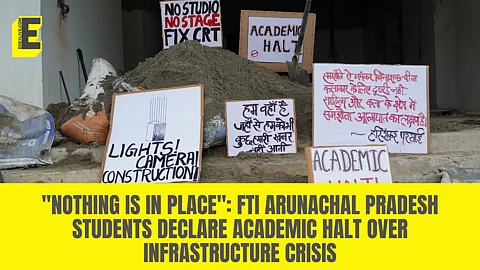

In a bold stand against what they describe as "months of administrative apathy," students of the Film and Television Institute, Arunachal Pradesh (FTI ArP) have declared an indefinite academic halt, marking the second such protest this year.
The protest, which began on May 15, comes from the institute's very first batch of students who claim they are studying in a national institution that exists "on paper" but is a "neglected reality in practice."
National institutions on paper, neglected reality in practice
According to a press release issued by the students on May 18, the protest stems from unfulfilled promises regarding infrastructure and basic amenities despite a previous academic halt in March that had led to written commitments from the administration.
"We demand education with dignity, not promises with deadlines!" the students declared in their statement.
The students' list of grievances is extensive and fundamental: lack of clean drinking water, unreliable electricity, no power backup, inadequate campus security, unsafe or unfinished classrooms, and sporadic internet access.
Unfinished campus, unresolved promises
A student representative, who requested anonymity, fearing repercussions due to the absence of a formal student body, detailed the grim reality at the institution.
"Students continue to fall sick due to unsafe water, face frequent internet blackouts, and attend classes in unsafe or unfinished spaces," the representative told this reporter. "We have put in a formal letter regarding the academic halt on May 16. Administration replied on Sunday evening, citing a few developments which were about to happen in the coming days, but these were again false promises."
The student emphasised that the majority of their peers are participating in the protest, though a few continue attending classes due to attendance requirements or personal reasons.
Beyond infrastructure: Administrative chaos
Beyond physical infrastructure, students allege the institute lacks even basic institutional identity — no formal name, logo, website, or student ID cards. There is no full-time director on campus, and administrative functions are reportedly hampered by understaffing and mismanagement.
The anonymous representative revealed troubling details about the hiring process for non-teaching staff, which has been fraught with controversy.
"Back then, when they were hiring for the non-teaching staff, the locals here protested and revolted violently for not allowing them to work in the institute and not giving them jobs, rather hiring outsiders" the student explained. "They said that since this is our place, and we have donated our land, we deserve the right to work here, and no one else."
This reportedly resulted in hiring decisions being made under the supervision of the local DC (District Commissioner) office rather than based on qualifications relevant to a film institute. They emphasised that we are not against the locals getting hired. However, there should be a proper process that ensures the recruitment of skilled staff.
They don't know their job
The consequences of this approach have been severe, according to the student representative.
"They are not at all skilled, and they don't know their job," the student claimed, describing an incident where a faculty member asked a camera assistant to set up equipment and received the response, "Sir, karna kya hai?" (Sir, what am I supposed to do?)
In another instance, due to a lack of designated spaces, students were told they could practice using film equipment in their hostel corridor.
"The institution just started without any prerequisites. It was not ready," the student stated bluntly. "In a state of chaos or confusion... nothing is in place. These are the actual words that we are choosing to describe the situation: Nothing is in place."
Key demands
The students have issued a comprehensive list of immediate demands, stating they will not participate in academic activities "until visible action is taken and timelines shared in writing."
Their demands span ten critical areas, including:
- Completion of basic infrastructure (classroom blocks, boundary walls)
- Reliable electricity and power backup
- Clean drinking water
- Official recognition with ID cards
- Administrative reforms, including a full-time director
- Functional internet access
- Postal services
- Access to editing workstations
- Proper security
- Medical facilities.
Additionally, students refuse to participate in their second semester unless essential facilities like the preview theatre, shooting floor, and library resources are made operational.
Support growing, next steps planned
The protesting students report receiving solidarity from various quarters, including Hyderabad University, other Central universities, the Arunachal Film Collective, and prominent filmmakers like Vikramaditya Motwani and Hansal Mehta.
Students are now targeting their appeals to filmmakers who might speak on their behalf, sending "cold emails" and direct messages on social media. They're also planning to approach legal advisors and potentially the Supreme Court.
The Central Public Works Department (CPWD) and the Ministry of Information and Broadcasting are in their crosshairs as the students seek accountability.
"CPWD is blaming the contractor, and the contractor is blaming CPWD," the student representative explained. "We want accountability for this, as well as completion of the remaining infrastructure that is not yet in place."
With the academic calendar already in its ninth week of the first semester, students say they can't afford to waste more time waiting for promises to materialise.
